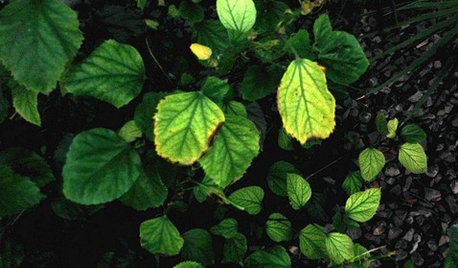What does ironite do?
Ive seen ironite in stores and was wondering what exactly is this for and when/how do you apply it? Thanks.
Comments (29)
bpgreen
14 years agoThe main reason people use ironite is to add iron to their lawns. If your soil is deficient in iron your grass may turn yellow as a result. In some cases, there may be enough iron, but the soil pH is out of whack and the grass can't use the iron.
Ironite is disliked by some people because it has a lot of other metals (including heavy metals) in addition to the iron. I used it many years ago but would probably not use it now.
If you've had a soil test that shows that your soil is low in iron, adding iron will help turn the lawn green. If your soil has enough iron, adding iron is unlikely to help (if your pH is bad, adding iron can provide a short-lived boost).
There are other alternatives to Ironite that don't have the heavy metals in them.
Related Professionals
Leawood Landscape Architects & Landscape Designers · Stoughton Landscape Contractors · Cary Landscape Contractors · Darien Landscape Contractors · East Lake-Orient Park Landscape Contractors · El Sobrante Landscape Contractors · Plantation Landscape Contractors · Rancho Santa Margarita Landscape Contractors · Salem Landscape Contractors · Shirley Landscape Contractors · Suitland Landscape Contractors · Tehachapi Landscape Contractors · Yuba City Landscape Contractors · Silver Firs Landscape Contractors · Hawaiian Gardens Landscape Contractorsmetal
14 years agoFrom the EPA's website:
Ironite®, once available at many lawn and garden stores, was a common fertilizer made from mine tailings. The presence of heavy metals in Ironite® lead to its banning in Canada, and lawsuits in the United States due to the potential release of heavy metals notably arsenic and lead.
shortlid
13 years agoUnfortunely I applied about a 3/4 of a 20 lb bag maybe 13 lbs worth mixwed with Green Moutain fertilizer 10-10-10 to get the green back in my ryegrass lawn. I have yet to water it in and I have a two year old and 3 month old. Shoudl I try to sweep or rake it up from the side of teh lawn near the well?
texasgardener_2010
13 years agoPlease see my post that my large mix-breed dog was diagnosed and died of cancer after I used Ironite in my yard for two summers preceding his diagnosis. He was only 6 years old when he died of cancer. Ironite has arsenic that is known to cause cancer. Government studies show its arsenic and lead levels exceed government safety standards but somehow it's still on the market. Don't use it or other chemical herbicides/pesticides. Protect your family, children, pets. Medical studies on these chemicals make the link clear to cancer. Go organic before it's too late. I lost a beloved member of my family in my quest for the beautiful American lawn. Never again. Live green with organics.
Here is a link that might be useful: one of many evaluations on Ironite showing hazards
lou_spicewood_tx
13 years agordaystrom,
Easy explanation for high rate of breast cancer in Wisconsin...
Chronic vitamin D deficiency.
http://www.vitamindcouncil.org/cancerBreast.shtml
Not only that, it's responsible for many things like autism, heart disease, diabetes type one, high blood pressure, cold ,flu, and it goes on. Vitamin D deficiency is wide spread. Doctors don't know much about it so we are rarely ever tested for it. Sun scare made it significantly worse which ironically is responsible for raising rate of malignant type of skin cancer.
All that information is in the literature... Doctors don't even bother reading them.
Best website for vitamin D is Vitamin D council. So much information there, it'd take a long time to understand the true reasoning for vitamin D in the first place. It is much more important than anyone realizes and that the daily recommended amount is extremely too low. maybe by as much as 10-20 times too low....
It is possibly the TRUE underlying cause to many illnesses...
rdaystrom
13 years agoLou, I agree with your excitement and emphasis on vitamin D. My physician told my wife and I about it, had our vitamin D levels tested, and recommended we start taking it daily. I probably get quite a bit from Sun exposure in the months when I'm working in the yard. In the winter I get little Sun exposure so I'll be taking Vitamin D regularly.
lou_spicewood_tx
13 years agordaystrom,
Glad you have a doctor that actually does something about it. Not very many out there from what I see on the internet.
I do make sure to take 5000 IU a day during the winter or I get cold followed by sinus infection followed by stuffed up nose that makes sleeping impossible followed by never ending dry cough every single winter. You'd think I'd get enough in Texas but obviously not. Then again, I don't really spend time outside when it's so hot outside. Maybe that's why. My brother who went to University of Wisconsin a few years ago said the weather was very nice there during the summer compared to Texas... Winter... not so much.
muffienh
11 years agoLou,
You are so right about Vitamin D. I am on dialysis and they give me D3 with most of my treatments. I was so depleted, I had to take 10,000 units in a prescription pill a day for at least 6 months. It helped stabilize my Calcium levels, and frankly stopped my aches and pains in my bones. I have recommended it to friends and one stopped the joints in her fingers from swelling from arthritis. The other still has knee pain, but feels better.
dchall_san_antonio
10 years agoShould what be used? Ironite or vitamin D?
If you have a recent soil test that indicates a shortage of available iron, then Ironite might work. It sort of depends on whether you live on calcium soil (most of Texas) or elsewhere.
fcivish
9 years agoIronite gets a bad rap for its trace heavy metals. Besides Iron, the signifcant heavy metals in Ironite are Lead and Arsenic. Sounds bad, right? But not so fast. First of all, the lead and arsenic in Ironite are chemically bound up in a form that even if you took ironite directly into your mouth and ate some, you would not adsorb any significant amount of lead or arsenic, since they are bound up and are NOT bioavailable.
Second, the amount of lead and arsenic is so low, that if you put Ironite on your grass, shrubs, fruit trees, and similar things and you used double the recommended amount, it would still take 50 years for the arsenic to build up to levels that would be 'cautionary' (though still not necessarily poisonous) and 250 years for the lead levels to build up to a similar degree. AND EVEN THEN, IT STILL WOULD NOT BE A PROBLEM, UNLESS THEY SOMEHOW LEACHED OUT OF THEIR CHEMICAL BINDINGS AND BECAME BIOAVAILABLE. This is unlikely to happen, since the soil itself continues to bind them and adsorb them, so they don't become bioavailable.
The point is when you hear words like LEAD and ARSENIC, is sounds scary, but the amounts in Ironite AND the bioavailability are far below scary. It is true they have been regulated in some places, like Canada, out of a sense of hypercaution, but that doesn't necessarily make them bad. AND, the fact that lawsuits have been filed against Ironite does NOT mean that those lawsuits had merit or that the people who filed them "won." To the best of my knowledge there has never been a successful lawsuit of any type against them, Because the science of it all is really on their side.
I don't use Ironite on my grass. But I do use it in my garden, particularly around my fruit trees sometimes, since our soil has iron in it, but the iron is also bound up in a way that it is not bioavailable to the fruit trees, so Ironite helps them. I never give it a second thought, because the science on its safety is very clear.dchall_san_antonio
9 years agofcivish, if you had a choice between Ironite and an equally effective material that had zero arsenic and zero lead, would you use Ironite or the other one.
morpheuspa (6B/7A, E. PA)
9 years ago+1 David. About half the arsenic in Ironite has been found to be of modest solubility in some studies. Until that's decided one way or another, it's on my no-no list just to be safe.
Since I can add iron using Milorganite at about the same level, or refined ferrous sulfate monohydrate at a far higher amount of iron than Ironite, I choose those two products. Plus both of those come with other advantages depending on the soil I'm recommending them for.
richsd
9 years agoI've tied Ironite two seasons so far. I totally understand how organic fertilizers are supposed to work (slowly.) So, I wasn't hoping for an overnight transformation of my garden. And I didn't get one.
What I found is the product's analysis does not have adequate levels of zinc sulfate IMO. I would wager that in most cases, the grower's nutritional problem is not iron, but is low levels of ZINC instead.
This added zinc is specially important to those of us who live in the west, due to our scanty rainfall, lack of organic matter, and alkaline soils and waters. All of these factors make the zinc in our dry soils all the less available to be taken up by plants.morpheuspa (6B/7A, E. PA)
9 years agoSoluble iron should green in days after application, so Milorganite and ferrous sulfate are both pretty quick when soil applied. Assuming you were iron short, which isn't necessarily the case. The impact of Milo on my lawn is rather minimal at this point as the soil bank of iron is quite large.
Not only zinc, but also nitrogen, magnesium, manganese, and boron are heavily used in the creation of chlorophyll or the photosynthetic process. A mis-balance on any of these resources impacts lawn color and quality. Plenty of other elements come into play on a lesser basis as well.
However, a good soil test is the only way to be sure of which one or ones are causing your issue.
fcivish
9 years agoIf I had the choice,would I use Ironite, or would I use a safe, non-toxic, even 'organic' alternative? Assuming they were equally efficacious, I would use whatever is cheapest. Without a second thought. I really think that the evidence is that Ironite is entirely safe, when used as directed, of course. The truth is, NOTHING in this life is completely safe or healthy, under all conditions, doses and and concentrations. But I think the evidence for the safety, in the amount we use, is quite compelling
hoganjr
9 years agoNot to high jack but is it too early to hit my lawn with Milo Morph? I know adding nitrogen in spring is pretty much a no no,early spring that is.
morpheuspa (6B/7A, E. PA)
9 years agoHijack away. Personally? I'd wait until May first at the earliest. Milo has some fast nitrogen (about 40%), and there's no sense in setting off any accelerated growth right now.
Unless the grass is severely yellow, it won't require much iron right now--and lighter greens in spring are normal due to fast growth and cooler, wet soil. The soil state tends to slow the release of iron.
Chad Stickley
8 years agoMy palms were very yellow. I was told by the nursery it was an iron deficiency they were correct. Ironite is working wonders









rdaystrom